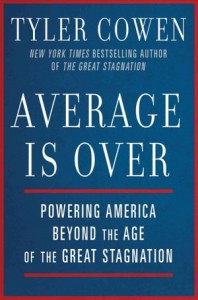 Tired of vapid novels featuring uninteresting characters that cannot manage in this complex world of ours? Then try Tyler Cowan’s, Average Is Over, (Dutton, New York 2013), which has the sub-title, Powering America Beyond the Age of the Great Stagnation, to give you a jolt of reality! I read it earlier this year.
Tired of vapid novels featuring uninteresting characters that cannot manage in this complex world of ours? Then try Tyler Cowan’s, Average Is Over, (Dutton, New York 2013), which has the sub-title, Powering America Beyond the Age of the Great Stagnation, to give you a jolt of reality! I read it earlier this year.
Cowan gives us a fresh, both pessimistic and optimistic, view of our future, using frequent analogies to the game of chess in this engaging book. We appear to live in a current situation of diminished job opportunities with low wages for most and extremely high wages for the few.
As Cowan states, “It’s becoming increasingly clear that mechanized intelligence can solve a rapidly expanding repertoire of problems,” but at the cost of growing unemployment. And the larger question is “can mechanized intelligence” help us solve the problem of supporting our population of 7.2 billion, possible increasing to 10 billion by 2050? We already recognize the scarcity of “quality land and natural resources, intellectual property, or good ideas about what should be produced, and quality labor with unique skills.” But are we actually “overloaded with information,” stunting our ability to deal with the future?
Cowan writes a wide-ranging challenge to our futures, pointing out that, “Risk taking in humans . . . tends to bring out sweat and emotion.” It also stimulates both fear and hope, as those involved in risk management can confirm. Four of his chapters warrant serious attention.
Chapter 5, Our Freestyle Future, confirms the radical changes in the availability and quality of information. He notes the “most frequently consulted ‘doctor’ in the U.S. today is Google!” Cowan concludes that “human-computer teams are the best,” that “the person working the smart machine doesn’t have to be an expert in the task at hand,” and that “knowing one’s own limits is more important than it used to be.”
Chapter 6, Why Intuition Isn’t Helping You Get a Job, suggests we should “be skeptical of the elegant and intuitive theory,” and that “we should revel in messiness.” I particularly like that latter admonition, given the clutter in my own office. He also warns “the advances of genius machines (IBM’s Watson, for example – my comment) come in an uneven and staggered fashion.”
Chapter 9, The New Geography, confirms that “outsourcing” has always been a practice. It goes in all directions. And “immigration is vital to the future economic vitality of the United States.” After all, we are all foreigners … save for the few remaining native Americans. But can we, globally, manage increasingly free movement of our species?
Perhaps his most challenging chapter is 10, Relearning Education, in which he challenges almost all the current models. MOOCs (Massive Open On-line Courses) create an entirely “new world of competitive education, based on interaction with machine intelligence.” Cowan predicts the future of education will be underwritten by the following concepts: online education will be extremely cheap; it will be more flexible; there will be major profits from teaching innovations; and, finally, it will allow much more precise measurement of learning.”
Our “human instructors” will be “much more important for motivation, psychology, and teaching pacing” than in the past. They will become “a mix of exemplars and nags and missionaries.” With three of our children and their spouses involved in education, this chapter has special pertinence.
There is nothing, my friends, nothing quite so stimulating as a complete challenge to old convictions!

About the author: Felix Kloman is a sailor, rower, husband, father, grandfather, retired management consultant and, above all, a curious reader and writer. He’s explored how we as human beings and organizations respond to ever-present uncertainty in two books, ‘Mumpsimus Revisited’ (2005) and ‘The Fantods of Risk’ (2008). A 20-year resident of Lyme, he now writes book reviews, mostly of non-fiction that explores our minds, our behavior, our politics and our history. But he does throw in a novel here and there. For more than 50 years, he’s put together the 17 syllables that comprise haiku, the traditional Japanese poetry, and now serves as the self-appointed “poet laureate” of Ashlawn Farms Coffee, where he may be seen on Friday mornings.
His wife, Ann, is also a writer, but of mystery novels, all of which begin in a bubbling village in midcoast Maine, strangely reminiscent of the town she and her husband visit every summer.